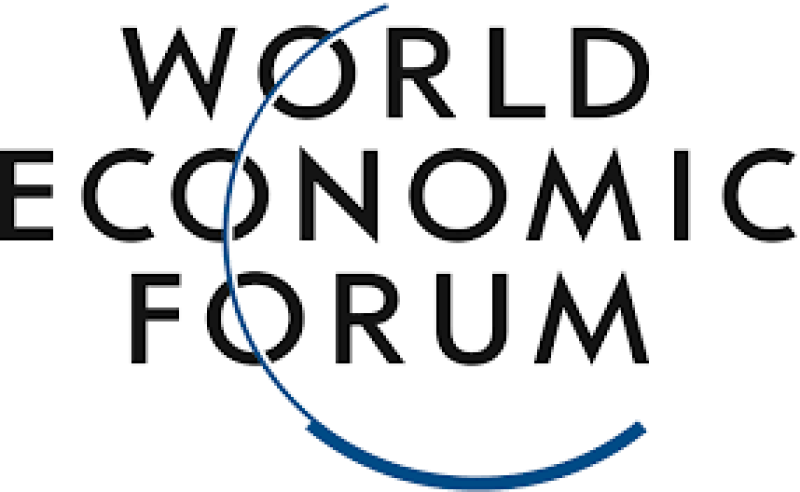- Hasina Gets 10 Years in Purbachal Plot Corruption Cases |
- NASA Finds Ammonia Compounds on Jupiter Moon Europa |
- Remittance Inflow Surges 45% to $3.17bn in January |
- Militant Attacks Kill 33 in Balochistan; 92 Assailants Dead |
- Power generation at Payra Thermal Power Plant 1st unit starts after a month |
Economic Outlook for 2025 Weighed Down by Fragmentation, Debt & Pol Uncertainty

WEF logo. Wikipedia
• 56% of leading chief economists expect weaker global economic conditions in 2025, compared to only 17% expecting improvement.
• Optimism on the short-term prospects for US growth is tempered by concerns over rising debt and inflation, while Europe has now recorded the weakest regional growth outlook for nearly three years.
• 48% of chief economists still expect global trade volumes to rise, despite intensifying concerns over retaliatory cycles of protectionist measures.
• Read the full report here. Follow the Annual Meeting 2025 here and on social media using #WEF25
Geneva, Switzerland, 16 January 2025 – The global economy is set to face significant challenges in 2025, with 56% of chief economists surveyed expecting conditions to weaken, according to the latest Chief Economists Outlook from the World Economic Forum. Only 17% foresee an improvement, pointing to heightened uncertainty in key regions and the need for measured policy responses worldwide.
While the United States appears poised for a short-term boost – with 44% of chief economists predicting strong growth in 2025, up from 15% when they were asked in August last year – the outlook for the year ahead remains less optimistic for other major economies. Europe continues to rank as the weakest region for the third consecutive year, with nearly three-quarters (74%) expecting weak or very weak growth. Meanwhile, China’s economic momentum is projected to slow amid subdued consumer demand and weaker productivity, further illustrating the uneven and uncertain nature of any global recovery.
“The latest Chief Economists Outlook reveals a global economy under considerable strain,” said Aengus Collins, Head of Economic Growth and Transformation, World Economic Forum. “The growth outlook is at its weakest in decades and political developments both domestically and internationally highlight how contested economic policy has become. In this environment, fostering a spirit of collaboration will require more commitment and creativity than ever.”
The US Economy: Short-Term Momentum, Longer-Term Caution
The new report underscores the significance of the recent US presidential election, with 61% of chief economists characterizing the impact for the global economy as a long-term shift rather than a short-term disruption. Major changes are expected in areas such as trade, migration, deregulation, fiscal policy and industrial policy. The chief economists’ solid outlook for US growth in 2025 is in line with their expectation of near-term stimulus and of rising wages. However, they remain mindful of risks, with almost all expecting a rise in public debt levels (97%) and higher inflation (94%).
Global Integration under Growing Strain
In addition to subdued global growth prospects, the Chief Economists Outlook reveals intensifying pressures on the world’s economic interconnectedness. A vast majority of respondents (94%) predict further fragmentation of goods trade over the next three years, while 59% expect services trade to follow a similar path. More than three-quarters also foresee higher barriers to labour mobility, while almost two-thirds point to rising constraints on technology and data transfers. The financial sector stands out as an exception, with less than half (48%) expecting an increase in fragmentation, likely reflecting the pivotal role of cross-border financial flows in modern economies. Nevertheless, domestic and international political developments, supply-chain realignments and security concerns loom large. These shifts are likely to push up costs for businesses and consumers alike over the next three years. Business responses to the increasing fragmentation of the global economy are expected to include restructuring supply chains (91%), regionalizing operations (90%) and focusing on core markets (79%).
Trade Outlook: Navigating Rising Pressures
Nearly half (48%) of chief economists anticipate an increase in global trade volumes in 2025, underscoring the resilience of global commerce. However, a large majority expect intensifying trade tensions, both between major powers and more widely. Protectionism is identified as the primary factor that will drive lasting changes to global trade patterns, with other prominent contributors including conflict, sanctions and national security concerns. Some 82% of respondents predict greater regionalization of trade over the next three years, alongside a continuing gradual shift from goods to services.
About the Chief Economists Outlook Report
The Chief Economists Outlook builds on the latest policy development research as well as consultations and surveys with leading chief economists from both the public and private sectors, organized by the World Economic Forum’s Centre for the New Economy and Society. It aims to summarize the emerging contours of the current economic environment and identify priorities for further action by policy-makers and business leaders in response to the compounding shocks to the global economy. The survey featured in this briefing was conducted in late November 2024.
The Chief Economists Outlook supports the World Economic Forum’s Future of Growth Initiative, a two-year campaign aimed at inspiring discussion and action on charting new pathways for economic growth and supporting policy-makers in balancing growth, innovation, inclusion, sustainability and resilience goals. Learn more about the Future of Growth Initiative here.
About the Annual Meeting 2025
The World Economic Forum Annual Meeting 2025, taking place in Davos-Klosters, Switzerland, from 20 to 24 January, convenes global leaders under the theme, Collaboration for the Intelligent Age. The meeting will foster new partnerships and insights to shape a more sustainable, inclusive future in an era of rapidly advancing technology, focusing on five key areas: Reimagining Growth, Industries in the Intelligent Age, Investing in People, Safeguarding the Planet, and Rebuilding Trust.

